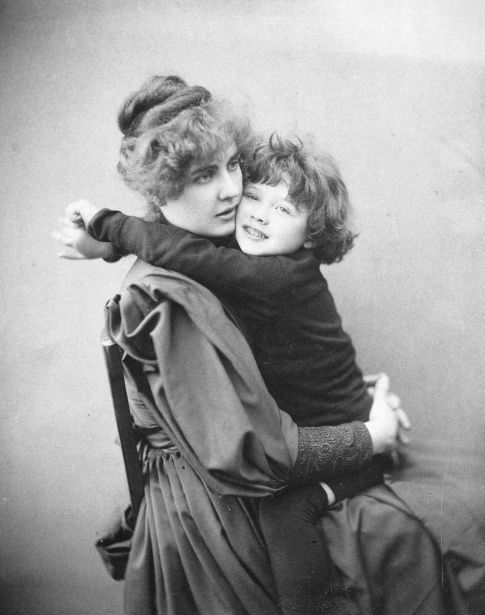17. He's A Real Wilde One
/In honor of his 164th birthday, Leigh and Gretchen talk about the life and times of Oscar Wilde with special guest K. W. Moore from the blog “A Scholar of No Importance.” Wilde’s unwillingness to conform to Victorian sensibilities regarding keeping his private life private and the famous trials that resulted from it changed the shape of Western discussions of sexuality thereafter. His writing, too has left its mark both on the world, and on all three of our hosts this episode. So come join us as we pay homage to the Wilde man himself, the man who sought to live up to his blue china and worried he might fall short.
Where to Find our Guest Host K. W. Moore
A Closer Look at Oscar Wilde
A young Oscar Wilde, 2 years old.
Oscar Wilde at Oxford.
One of a series of “fancy portraits” by cartoonist Linley Sambourne mocking contemporary personalities. This one of Oscar Wilde was Published June 25, 1881.
“The Modern Messiah,” a Cartoon depicting Oscar Wilde's 1882 visit to San Francisco by George Frederick Keller. Published in The Wasp, March 31, 1882.
Constance wilde with son cyril.
Vyvyan (left) and Cyril (right) Holland.
One of a series of portraits done of Oscar Wilde by Napoleon Sarony in 1882.
Another Sarony portrait from 1882.
A third portrait from the 1882 session with Napoleon Sarony.
Oscar Wilde with a carnation in his buttonhole. Portrait by Alfred Ellis & Walery Studio, 1892.
Bosie Douglas with his brother Frederick Douglas.
Oscar Wilde (Left) with lover Bosie Douglas (right), 1893.
Robbie Ross (Left) and Reginald Turner (Right), circa 1893.
Excerpts from De Profundis:
“To regret one’s own experiences is to arrest one’s own development. To deny one’s own experiences is to put a lie into the lips of one’s own life. It is no less than a denial of the soul.”
—
“Love does not traffic in a marketplace, nor use a huckster's scales. Its joy, like the joy of the intellect, is to feel itself alive. The aim of Love is to love: no more, and no less. You were my enemy: such an enemy as no man ever had. I had given you all my life, and to gratify the lowest and most contemptible of all human passions, hatred and vanity and greed, you had thrown it away. In less than three years you had entirely ruined me in every point of view. For my own sake there was nothing for me to do but to love you.”
—
“The final mystery is oneself. When one has weighed the sun in the balance, and measured the steps of the moon, and mapped out the seven heavens star by star, there still remains oneself. Who can calculate the orbit of his own soul?”
—
“A sentimentalist is simply one who wants to have the luxury of an emotion without paying for it. We think we can have our emotions for nothing. We cannot. Even the finest and most self-sacrificing emotions have to be paid for. Strangely enough, that is what makes them fine. The intellectual and emotional life of ordinary people is a very contemptible affair. Just as they borrow their ideas from a sort of circulating library of thought—-the Zeitgeist of an age that has no soul—-and send them back soiled at the end of each week, so they always try to get their emotions on credit, and refuse to pay the bill when it comes in. You should pass out of that conception of life. As soon as you have to pay for an emotion you will know its quality, and be the better for such knowledge. And remember that the sentimentalist is always a cynic at heart. Indeed, sentimentality is merely the bank holiday of cynicism.”
—
“Society takes upon itself the right to inflict appalling punishment on the individual, but it also has the supreme vice of shallowness, and fails to realise what it has done. When the man’s punishment is over, it leaves him to himself; that is to say, it abandons him at the very moment when its highest duty towards him begins. It is really ashamed of its own actions, and shuns those whom it has punished, as people shun a creditor whose debt they cannot pay, or one on whom they have inflicted an irreparable, an irremediable wrong.”
—
“Every single human being should be the fulfilment of a prophecy: for every human being should be the realisation of some ideal, either in the mind of God or in the mind of man.”
—
“The aim of Love is to love: no more, and no less.”
—
If you want to learn more about Oscar Wilde, check out our full list of sources and further reading below!
Online Articles:
Books and Print Articles:
Graham Robb, Strangers: Homosexual Love in the Nineteenth Century
Richard Dellamora, Masculine Desire: The Sexual Politics of Victorian Aestheticism
Ned Katz, Love Stories: Sex Between Men Before Homosexuality
Neil McKenna, The Secret Life of Oscar Wilde
Barbara Belford, Oscar Wilde: A Certain Genius
Richard Ellman, Oscar Wilde
Frank Harris, Oscar Wilde: His Life and Confessions
Terence Crawford, The Last Illness of Oscar Wilde
Oscar Wilde, The Picture of Dorian Gray
Ed. Merlin Holland, The Real Trial of Oscar Wilde
“Bachelor Friendships of the Nineteenth Centuries” in Proud Heritage: People, Issues, and Documents of the LGBT Experience
Ben Griffin, The Politics of Gender in Victorian Britain
Franny Moyle, Constance: The Tragic and Scandalous Life of Oscar Wilde















